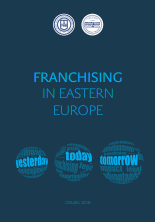FRANCHISING BUSINESS MODEL IN THE MACEDONIAN ECONOMY
FRANCHISING BUSINESS MODEL IN THE MACEDONIAN ECONOMY
Author(s): Jovanka Damoska Sekuloska
Subject(s): Economy, National Economy, Business Economy / Management, Economic policy, Evaluation research, Law on Economics, Financial Markets, Marketing / Advertising
Published by: Sveučilište Josipa Jurja Strossmayera u Osijeku, Ekonomski fakultet u Osijeku
Keywords: Easter Europe; Macedonia; economy; franchising; legislation; marketing; business model; evaluation;
Summary/Abstract: Implementation of a variety of business models of internationalization contributes to overcoming the limited size of national markets. Today’s global competitiveness recognizes the necessity for qualitative and quantitative improvement of the process of internationalization of companies. The internationalization process is important as an enabler of national competitiveness and as a strategic option for businesses. As a process of integration in international activities, internationalization enables companies to expand their operating activities across the border of their national markets on the one hand and on the other, it determines and influences the market size of an economy as one of the determinants of competitiveness of economies. Organizations need to choose how to enter a market. Entry modes differ in the degree of resource commitment to a particular market, and the extent to which an organization is operationally involved in a particular location ( Johnson et al., 2008). The key entry mode types are: exporting, contractual arrangement through licensing and franchising; joint ventures and alliances, and foreign direct investment. By expanding its markets internationally, a firm can bypass limitations in the domestic market ( Johnson et al., 2005).
Book: Franchising in Eastern Europe - Yesterday, Today, Tomorrow
- Page Range: 127-143
- Page Count: 17
- Publication Year: 2018
- Language: English
- Content File-PDF

